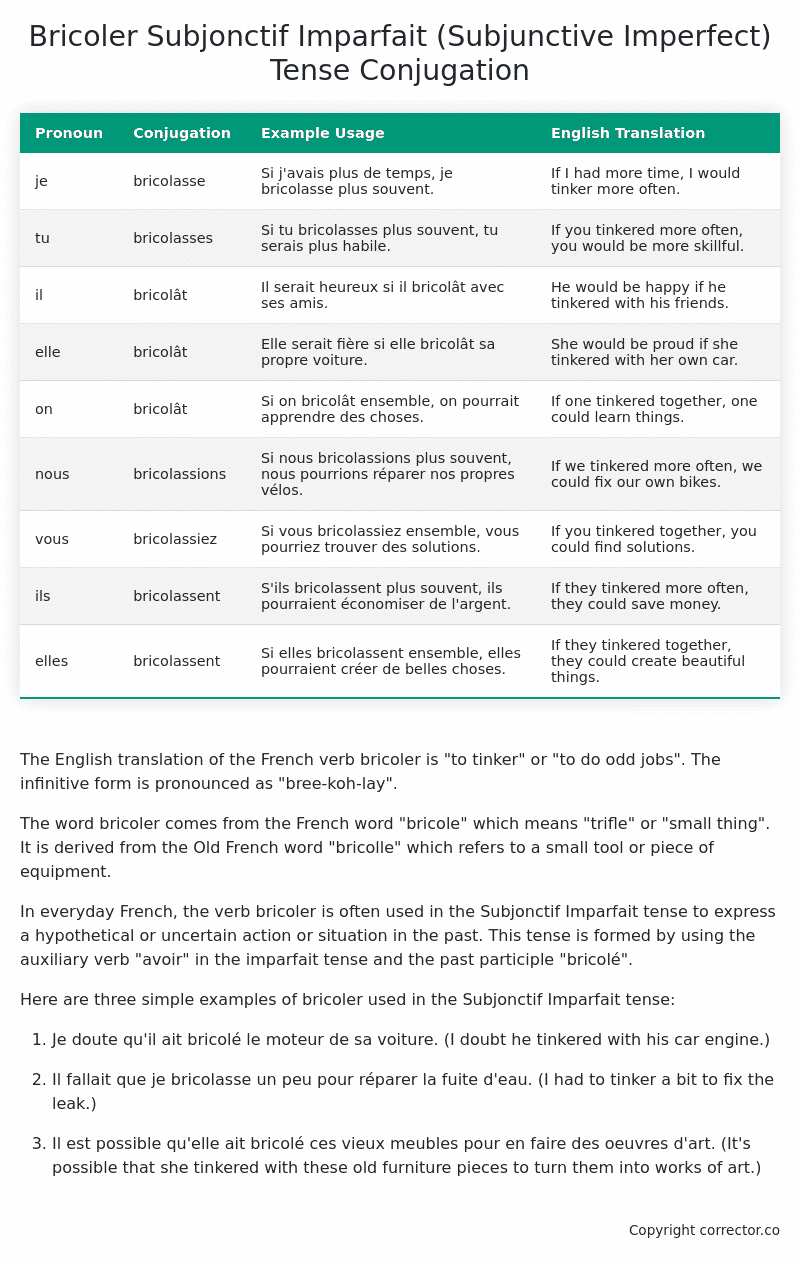Subjonctif Imparfait (Subjunctive Imperfect) Tense Conjugation of the French Verb bricoler
Introduction to the verb bricoler
The English translation of the French verb bricoler is “to tinker” or “to do odd jobs”. The infinitive form is pronounced as “bree-koh-lay”.
The word bricoler comes from the French word “bricole” which means “trifle” or “small thing”. It is derived from the Old French word “bricolle” which refers to a small tool or piece of equipment.
In everyday French, the verb bricoler is often used in the Subjonctif Imparfait tense to express a hypothetical or uncertain action or situation in the past. This tense is formed by using the auxiliary verb “avoir” in the imparfait tense and the past participle “bricolé”.
Here are three simple examples of bricoler used in the Subjonctif Imparfait tense:
-
Je doute qu’il ait bricolé le moteur de sa voiture. (I doubt he tinkered with his car engine.)
-
Il fallait que je bricolasse un peu pour réparer la fuite d’eau. (I had to tinker a bit to fix the leak.)
-
Il est possible qu’elle ait bricolé ces vieux meubles pour en faire des oeuvres d’art. (It’s possible that she tinkered with these old furniture pieces to turn them into works of art.)
Table of the Subjonctif Imparfait (Subjunctive Imperfect) Tense Conjugation of bricoler
| Pronoun | Conjugation | Example Usage | English Translation |
|---|---|---|---|
| je | bricolasse | Si j’avais plus de temps, je bricolasse plus souvent. | If I had more time, I would tinker more often. |
| tu | bricolasses | Si tu bricolasses plus souvent, tu serais plus habile. | If you tinkered more often, you would be more skillful. |
| il | bricolât | Il serait heureux si il bricolât avec ses amis. | He would be happy if he tinkered with his friends. |
| elle | bricolât | Elle serait fière si elle bricolât sa propre voiture. | She would be proud if she tinkered with her own car. |
| on | bricolât | Si on bricolât ensemble, on pourrait apprendre des choses. | If one tinkered together, one could learn things. |
| nous | bricolassions | Si nous bricolassions plus souvent, nous pourrions réparer nos propres vélos. | If we tinkered more often, we could fix our own bikes. |
| vous | bricolassiez | Si vous bricolassiez ensemble, vous pourriez trouver des solutions. | If you tinkered together, you could find solutions. |
| ils | bricolassent | S’ils bricolassent plus souvent, ils pourraient économiser de l’argent. | If they tinkered more often, they could save money. |
| elles | bricolassent | Si elles bricolassent ensemble, elles pourraient créer de belles choses. | If they tinkered together, they could create beautiful things. |
Other Conjugations for Bricoler.
Le Present (Present Tense) Conjugation of the French Verb bricoler
Imparfait (Imperfect) Tense Conjugation of the French Verb bricoler
Passé Simple (Simple Past) Tense Conjugation of the French Verb bricoler
Passé Composé (Present Perfect) Tense Conjugation of the French Verb bricoler
Futur Simple (Simple Future) Tense Conjugation of the French Verb bricoler
Futur Proche (Near Future) Tense Conjugation of the French Verb bricoler
Plus-que-parfait (Pluperfect) Tense Conjugation of the French Verb bricoler
Passé Antérieur (Past Anterior) Tense Conjugation of the French Verb bricoler
Futur Antérieur (Future Anterior) Tense Conjugation of the French Verb bricoler
Subjonctif Présent (Subjunctive Present) Tense Conjugation of the French Verb bricoler
Subjonctif Passé (Subjunctive Past) Tense Conjugation of the French Verb bricoler
Subjonctif Imparfait (Subjunctive Imperfect) Tense Conjugation of the French Verb bricoler (this article)
Subjonctif Plus-que-parfait (Subjunctive Pluperfect) Tense Conjugation of the French Verb bricoler
Conditionnel Présent (Conditional Present) Tense Conjugation of the French Verb bricoler
Conditionnel Passé (Conditional Past) Tense Conjugation of the French Verb bricoler
L’impératif Présent (Imperative Present) Tense Conjugation of the French Verb bricoler
L’infinitif Présent (Infinitive Present) Tense Conjugation of the French Verb bricoler
Struggling with French verbs or the language in general? Why not use our free French Grammar Checker – no registration required!
Get a FREE Download Study Sheet of this Conjugation 🔥
Simply right click the image below, click “save image” and get your free reference for the bricoler Subjonctif Imparfait tense conjugation!

Bricoler – About the French Subjonctif Imparfait (Subjunctive Imperfect) Tense
Formation
Common Everyday Usage Patterns
Interactions with Other Tenses
Subjonctif Présent
Indicatif Passé Composé
Conditional
Conditional Perfect
Summary
I hope you enjoyed this article on the verb bricoler. Still in a learning mood? Check out another TOTALLY random French verb conjugation!


